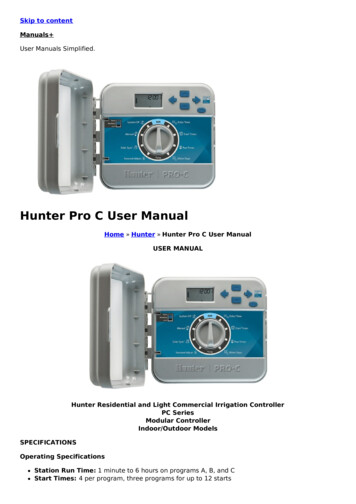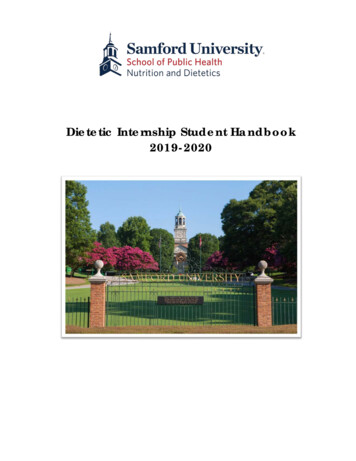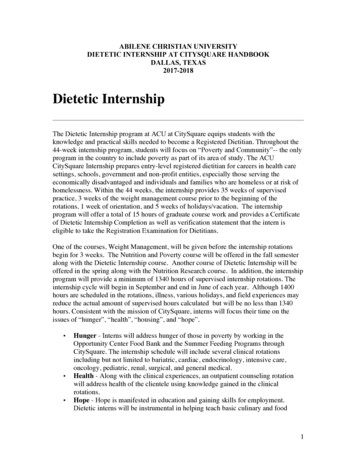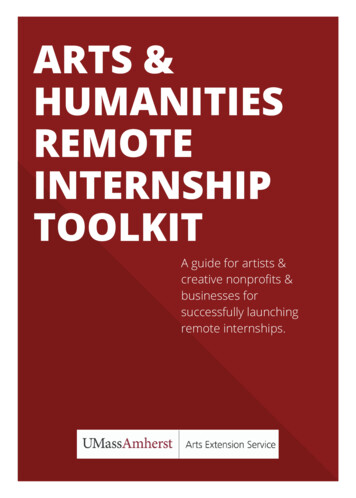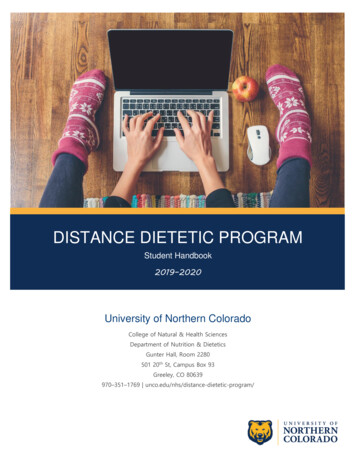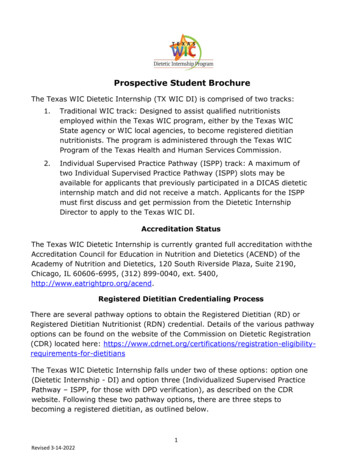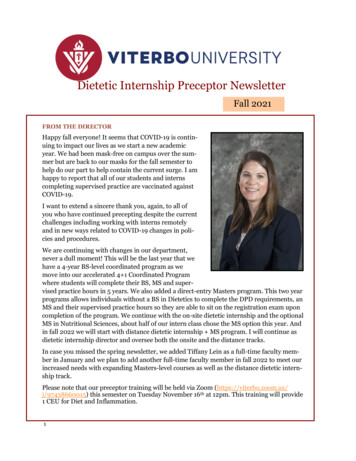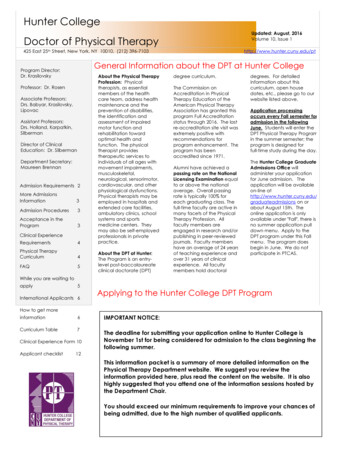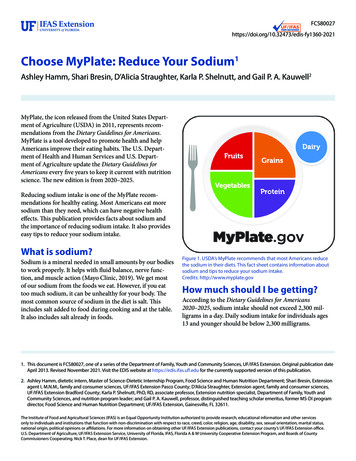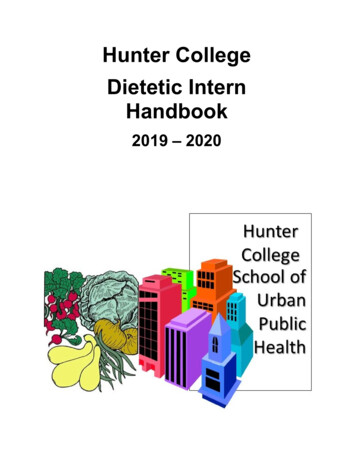
Transcription
Hunter CollegeDietetic InternHandbook2019 – 2020
ContentsWhat to Expect from the Dietetic Internship Program. 3What the DI Program Provides: . 3Things the DI Program does NOT provide include, but are not limited to:. 3Information about weather emergencies . 4Finding Your Way at the Social Work and Urban Public Health Library . 4Estimated Financial Costs for the Dietetic Internship Program . 5Dietetic Internship Checklist . 72017 – 2018 DI “To Do” Check List . 10Expectations of Dietetic Interns . 12About “Clinical Judgment” . 14Thank you notes . 14Health Insurance Portability and Accountability Act (HIPAA) . 15Academy of Nutrition and Dietetics/Commission on Dietetic Registration Code of Ethics for theProfession of Dietetics and Process for Consideration of Ethics Issues . 16Americans with Disabilities Act ‐ What it means for Dietetic Interns . 17Who’s Who? Meet the NFS Faculty . 18NETWORKING. 22THE ACADEMY OF NUTRITION AND DIETETICS . 23Groups . 23Stress Management Resources . 24WWW Resources for Nutrition & Health . 26Career Opportunities in Dietetics and Nutrition for Graduates of the Dietetic Internship Program . 28Finding a Nutrition Job ONLINE . 28A Final Thought . 29Acknowledgements. Error! Bookmark not defined.2
What to Expect from the Dietetic Internship ProgramWhat the DI Program Provides: OrientationA weekly seminar on topics in food / nutritionOccasional snacksModules with lots of information to help with successful completion of your rotationsOpportunities to work in a variety of settings in the New York Metropolitan areaScheduling of rotations with the interns’ interests and preferences takeninto considerationSimulation exercises to meet some of the ACEND learning objectivesInformation about and opportunities to attend conferences and workshops about food /nutrition topicsReview for the RD examA Verification Statement upon finishing the InternshipAssistance in obtaining the NYS CDN credential upon finishing the Internship*Note the DI is 12 credits in its entirety, there will be no partial credits given for anyone notcompleting the entire 9 month internship. There are absolutely NO INCOMPLETES for theInternship.Things the DI Program does NOT provide include, but are not limited to: Financial AidHousingMeal service (except as noted)TransportationAssistance with entitlements (i.e. Food Stamps)Psychological counseling / treatmentMedical CareChildcareOr a guarantee of placement in any or all of the intern's preferred rotation sitesAlso note: Interns are not allowed to “bump” another intern from an assigned rotation site.Matching / admission to the Dietetic Internship does not constitute a guarantee of programcompletion, passing the Registered Dietitian Exam, or obtaining gainful employment inany capacity.Duration of the program may be subject to change based on factors including, but not limitedto, changes in availability of rotation sites, absence or non-availability of preceptors, or failureof an intern to satisfactorily complete the work and/or time commitment for any rotation,which may result in a substantial delay in program completion.3
The above disclaimer specifically disavows liability for any perceived damages due to any ofthe above by; The Dietetic Internship, Internship Director, Nutrition and Food Scienceprogram, Nutrition and Food Science Program Director and faculty, Hunter College, TheCUNY School of Urban Public Health, and the City University of New York.Information about weather emergencies and other factors that may impact your attendance at rotation sites or DI Seminar isavailable from:In severe weather conditions, you can stay informed about possible school closings andschedulechangesbysubscribingtoCUNYAlert.Changes in operations will be also posted at www.hunter.cuny.edu and broadcast throughthe CUNY Central Administration on the following radio stations: WADO 1280 AM (Spanish-language) WBLS 107.5 FM WCBS 880 AM WFAS 1230 AM WFAS 103.9 and 106.3 FM WINS 1010 AM WLIB 1190 AM WOR 710 AMStudents and personnel at the Hunter College Campus Schools follow the proceduresissued by the New York City Department of Education. During emergencies, the CUNYcentral website will also provide information to the University community.Please note that the rotation sites have their own policies for closing. If you choose notto attend a day at a rotation site due to severe weather conditions, communicate with yourpreceptor beforehand.Finding Your Way at the Social Work and Urban Public Health LibraryThings you need to know 1. Your Hunter ID is your One Card. Use it to check out library books, makephotocopies, print, pay fines, or to access your library account. More ard2. Looking for books, DVDs and more? Search in the online library catalog, CUNY .CUNY is a listing of all the materials held by the Hunter College Libraries, as well asother CUNY schools. You can find CUNY under “Find” on the library website:http://library.hunter.cuny.edu/3. Need a book that Hunter doesn’t own? You can request and borrow books from other4
CUNY schools using CLICS: CUNY Libraries Inter-Campus Service. Find out gon.html4. The library has study rooms available. Rooms can be reserved for two hours. Reservationsmust be made in person, not over the phone, and can be made one week in advance.5. Sometimes instructors will put course materials on reserve in the library. Materials canbe on electronic reserve (online) or physically at the library. Learn more aboutreserves: http://hunter.docutek.com/eres/6. The Hunter College Libraries are staffed with friendly, knowledgeable librarians who arehappy to help and can save you loads of time. You can contact a librarian in person at thereference desk, on the phone (212) 396-7656, via email, or IM with Ask A Librarianwhich is accessible through the main library page.7. All of the Hunter College Libraries have wireless Internet access. Bring your ownlaptop, or check out one of ours. Learn more ers-wireless-network8. You can access our electronic resources online anytime, anywhere, as long as you havean Internet connection. Find out how: http://library.hunter.cuny.edu/access-home9. All the Libraries provide computers with adaptive software, as well as wheelchairaccessible workstations.10. For current Library hours: http://library.hunter.cuny.edu/about/hours11. Keep up to date with Library news and events, leave comments, and learn about newlibrary resources by reading our Blog: http://library.hunter.cuny.edu/newsEstimated Financial Costs for the Dietetic Internship ProgramAll tuition and fees are determined by the City University of New York (CUNY) Board ofTrustees and are subject to change without notice.See: https://orapp.hunter.cuny.edu/tuition calculator/Please note that there are costs associated with Onboarding. We estimate a total of 300. Thecosts depend on the individual rotation sites. We have no control over their demands, but aim tochoose sites preferentially that cover the charges for onboarding costs. Please keep us informed.Also (Estimated costs for NYC) – these costs change rapidly. Please refer to the Hunterwebpages.Housing: Cost are highly variable, if sharing a rental apartment with at least one room-mate 12,000 /yr Utilities. (Hunter College estimates 10,386 for the 9 months of DI) Mostlandlords also expect 1st and last month’s rent up front.Books: In addition to basic reference books that may have been purchased during undergraduatestudy, 200 – 300 – since you already have a basic set of textbooks from your DPD programTransportation: NYC Metrocard minimum of 32 per week ( 1,200 for 35 weeks of DI)Food: Depends on what you usually eat; Hunter College estimates 3327/yr.Insurance: Health Insurance average cost: highly variable5
AND or other source Professional Liability Insurance apx. 42/yrIncidentals: (Entertainment, apparel, other) – Average 2,700/yrStudents are enrolled in the Dietetic Internship Program and are registered for 6 credits persemester. Although the student is considered full-time by the Dietetic Internship Program, thestudent is considered part-time by the registrar for calculation of tuition. Some students willtake MS courses during the internship. Any class taken in addition to the DI program must bediscussed with the Dietetic Internship Director prior to enrollment and will affect time tocompletion. Taking 15 credits per year or more makes you a full-time student.See ial-aid/cost-of-attendance-1 for moredetails.Dietetic Interns who require proof that they are enrolled in a full-time program canrequest a letter of full-time status from the Dietetic Internship Director.Students must pay tuition and fees in full at the time of registration. Without full paymentstudents will not be considered registered and will not be admitted to class.Meals are the responsibility of interns. However, some meals may be provided by rotation sites.Students are responsible for their own transportation to and from assigned sites. Wheneverpossible, practice sites have been selected which are easily accessible by public transportation andare located in generally safe neighborhoods.6
Dietetic Internship ChecklistBefore you can begin the Dietetic Internship, all of these essential documents must be collectedby the DI Director.Complete and submit the attached Dietetic Internship Student Information1.Sheet, resume, and bio-sketch, to Victoria.Fischer@hunter.cuny.edu2.Completed application as matriculated student, even if you are only enrolled inthe DI program, and if you are completing the MS Nutrition at Hunter College.3.Apply for Student Professional Liability Insurance beginning September 1stand submit copy of memorandum of insurance to DI Director on the first day oforientation. You must be covered by liability insurance throughout the entireinternship program. While many sites have contracts that use the CUNY liabilityinsurance for students, some sites are not covered by this policy. Coverage limits are 1million and 3 million, and the anticipated cost for the insurance is less than 40 for theyear.4.Submit proof of your permission to work in the United States of America, e.g.passport or visa with work permit, as black & white copies. You can redact passportnumber or social security number in pdf files, and present the original at orientation.5.Submit your record of immunization to the Office of Health Services by Augustst1 . Submit a copy of the form on the first day of orientation.6.Submit proof of immunization for Measles, Mumps, Rubella, Tetanus,Varicella, Meningitis, and Hepatitis B, as well as a current tuberculosis test (max.12 months old at any point in time of the DI) to the DI Director by the first day oforientation.7.Submit proof of a physical examination performed within 3 months of thestart of the DI program, on the first day of orientation. Please only submit proof thatyou had a physical examination and are fit for the Dietetic Internship, includingcontact with patients. DO NOT submit results of blood tests EXCEPT for titers in lieuof vaccinations, or findings from the physical exam unless relevant to your work inthe DI program.8.Submit copy of your medical health insurance to DI Director on the first dayof orientation.9.Obtain and submit your original DPD Verification Statement to the DIDirector on the first day of orientation.10. For degrees not included in transcripts sent to DICAS, obtain and submit anofficial transcript from the school where you received your highest degree(minimum is BS or BA) to the DI Director on the first day of orientation. Remember:This transcript must state that the degree HAS BEEN AWARDED. This isindependent of any transcript sent to Hunter Admissions.11. A photocopy of your membership card with AND, showing your membernumber.7
12.Provide the DI Director with your Hunter email address.While your DPD coursework has prepared you to begin your dietetic internship, it is criticalthat you begin your rotations with the right tools to ensure your success. It is also important tobe aware of the most current questions and information in the field. The suggested texts belowhave been ordered to the Hunter College bookstore, and will be available during orientationweek, however you may be able to obtain them less expensively elsewhere.Required Text BooksSee syllabus for the most reliable information.1. Jean Inman Review course, see Dietetics Seminar – you must bring proof of purchaseeven when purchasing used version from a private person2. Access required: Pronsky ZM, Crowe JP. Food Medication Interactions, , 18th Edition.2014. ISBN: 978-09710896623. Access required: Van Leeuwen AM, Poelhuis-Leth DJ, Bladh ML. Davis’s ComprehensiveHandbook of Laboratory and Diagnostic Tests with Nursing Implications. 5th Edition. FADavis Company. ISBN: 0803636644, or equivalent, e.g. Wallach: Handbook of Interpretationof diagnostic tests. Current ed., Lippincott.4.Access required: eNCPT: http://ncpt.webauthor.com/5. Access required: Nutrition Care Manual (On campus at Hunter m?c hunterco6. Use required: EAL, Cochrane Database of Systematic Reviews, U.S. Department of Healthand Human Services, Agency for Healthcare Research and Quality, National GuidelineClearinghouse WebsitesSuggested Text BooksAbott-Hess, M: Review of Dietetics, 2017-2019, Hess&Hunt 2017. ISBN: 978-0-9816769-9-9(Note: there are older editions. Those may not adequately reflect the current expectations forthe RD exam.)Nelms, Sucher, Lacey, Long Roth: Nutrition Therapy and Pathophysiology. 3rd ed., CengageLearning 2014; ISBN-13:978-1-305-11196-7This book provides a basic understanding of diseases and the related Medical NutritionTherapy.Escott-Stump S: Nutrition and Diagnosis-Related Care, Lippincott, Williams & Wilkins, 8th ed.This book provides an overview of practical aspects. It is not suited to understand the diseaseprocess.Payne-Palacio J, Theis M: Introduction to Foodservice, Pearson/ Prentice Hall, 11th ed.This is the go-to textbook for Foodservice and Management, though by far not the only resourcePronsky ZM, Elbe D, Ayoob K: Food – Medication Interactions, latest ed.This book is a must-have for dietitians. You’ll find it in many RD offices.8
Additional books will be on reserve in the Silberman building library.Additional articles and materials will be included the Intern Seminar will be posted toBlackboard and/or handed out in class.All Interns are required to subscribe to the NFS listserv.The listserv is a good source of information for things going on at the college, lectures andother events, as well as potential employers later on. Click the link below and follow theinstructions to add the NFS – L. (Note: if you are already subscribed, you do not have to do wa-hc.exe?SUBED1 NFS-L&A 1Keep a copy of the DI “To Do” Check List. (See below.)The purpose of this list is to help you stay on track for all that you have to do this year, aswell as help you to organize your e-portfolio.If you have not completed all the assignments, you will not be able to get a VerificationStatement for the DI.Internship Hours – What to Count Towards Required TimePer ACEND’s requirements, the minimum number of hours of supervised practice (internship)that are necessary for credentialing is 1200. The Hunter Dietetic Internship Program requires1280 hours of supervised practice for completion of the program. All interns document theiractivities and hours completed in the Intern Log (see Intern Assignments document). Of themany things that interns do, only certain ones “count” towards the supervised practicerequirement. The table below clarifies how to categorize your activities.CountHours working at a siteBreaks at sites, as part of theregular work week (30 min in a workday 6hrs)Meetings at sites, both staff meetings andin-service meetingsTime spent writing modules / assignments /logs / eportfolio (max. 75 hrs outside ofrotation sites)Don’t CountDI OrientationLunch or other meals at home, lunchbreak on siteTime at conferencesReading/writing e-mails or texts unlesspart of an assignment from preceptorSleeping, socializing, etc. on road tripsSocial media for yourself (except youre-portfolio)“Suggested” activities done for yourown knowledge.Conversations with DI DirectorPartying at GraduationActivities on “road trips” with preceptorSocial media work for preceptorWork done for preceptor away from thesite if it will be submitted to preceptorWork done for the Open HouseDI Seminar (except as noted onsyllabus)Preparatory reading for rotations9
2017 – 2018 DI “To Do” Check List Assignments for NUTR 700Assignments for NUTR 701Assignments for NUTR 702Assignments for NUTR 703 (Note ALL assignments for all 4 courses are listed in the InternAssignments document for your school year.)These assignments include the following: Projects for each rotation (see rotation descriptions) Service Improvement Project (not assigned to a specific rotation) Restaurant Review 2 Ethics papers 2 Topic Papers PDP draft with 20 year vision 4 Conference and webinar reportso Clinicalo Food Service / Managemento Public Healtho Other WIC training (8 certificates, submit pdfs) CITI modules (2 certificates, submit pdfs) ServSafe or DOH Food Safety Training (submit pdf) Counseling (Step by Step, alternatively complete the Hunter NUTR 748 course) Evaluations for each rotation: your evaluation of the site, preceptor evaluation of you, midevaluation for all rotations exceeding 5 weeks, and end-evaluation for each rotation Self-assessment of professionalism and goal setting Journals for all activities, including time spent on modules / assignments / logs / eportfolionot completed at a site Competency checklist of competenciesRotationJournal / LogDI Eval of SiteDI self-evalPreceptor Eval of DIprofessionalismCommunity 1Community 2ClinicalFood ServiceManagement(potential extra)10
11
Welcome to Hunter, where all the women arestrong, all the men are good-looking, and all theinterns are above average.-adapted from Garrison Keillor, in a Prairie Home Companion.When preceptors agree to host interns from our program, many of them ask me to “send us thevery best intern(s) you have this year.” So ALL of you should be my best intern, and consideryourself a representative of Hunter when you are out in the world.This not only can have a positive effect on your career, it can also open doors for the interns whowill come after you. A preceptor who is pleased with the performance of the intern they have thisyear, will want to come back to us, and maybe even increase the number of interns she/he is willingto host each year.Expectations of Dietetic InternsWhen you enter the Dietetic Internship program, we expect that you will:1. Be able to write and speak clear, coherent English so that others can understand you.If you have problems with writing or limited experience writing English, help is availablethrough the Hunter College Reading/Writing Center on line at http://rwc.hunter.cuny.edu/.Their website will lead you to the Center’s student and faculty guides, current workshopschedule, on-line handout file, and directions for e-tutoring (tutoring over e-mail). TheCenter is located on the fourth floor of Thomas Hunter Hall. The phone number is (212)650-3937. You may also get in touch with the Hunter College International EnglishLanguage Institute (IELI) at http://www.hunter.cuny.edu/ieli/ or (212) 772-4292 orieli@hunter.cuny.edu.2. Have access to a computer on a regular basis, at least 5 days per week. Computers areavailable in the computer labs on floor “C” (otherwise perceived as the basement).3. Maintain an e-mail account, check your e-mail daily, and reply promptly to messages.All Hunter students are provided with an e-mail address. As communication with the DIDirector may contain confidential information, all email will be sent to your Hunter emailaddress.4. Possess basic computer skills, including MS Office, Publisher, Excel, End Note orequivalent, etc. and finding appropriate information on the internet.5. You do not need to be on campus to gain access to journals. You can search the maindatabases (i.e. Medline, PubMed), from your home computer. Simply go to the libraryhome page: http://library.hunter.cuny.edu/ From the list, click “Databases”.There you will find a listing of journal search engines. Click on the one you wish to use(PubMed for example). Then it will prompt you to insert your Hunter email ID andpassword. You can search for and get access to most of the journal articles for free.6. All dietetic interns are expected to dress professionally. In general this is considered tobe business attire, or as appropriate to the specific rotation’s work setting. Hosiery or12
socks and closed shoes are required for clinical and food service rotations. Long hair mustbe clipped back securely, and protective hair covering (hat/hairnet) is generally requiredfor food service management rotations. During the clinical rotations, a white lab coat isrequired. When attending a seminar or professional meeting representing the DI program,business attire is required for everyone.7. When on duty in the rotation facilities, the student shall follow the regulations for thatfacility. Identification badges are to be worn at all times when on duty. These may eitherbe the Hunter College ID or one supplied by the rotation facility. Your preceptor needs toprovide you with the regulations to follow, and you need to write down where to find these,and what regulations / regulatory agency they are derived from. This record becomes partof your rotation portfolio.8. Interns are expected to be polite and respectful to their preceptors and everyone atthe rotation sites. Bear in mind that even the most ignorant person on earth could haveone little clue to life that could be valuable to you. Pay attention. Keep your eyes and earsopen for what you can learn from ANYONE. You should be respectful of everyone youmeet. Our preceptors are a diverse group of people, just as our interns are. They may besignificantly younger or older than you are, or different in some other way. You may alsobe working with someone who is not a Registered Dietitian. Never think that you knoweverything that there is to know, or that someone (like a clerk or kitchen worker) cannotteach you anything. If you have an issue with a preceptor, speak to her / him about it first,then the Clinical Nutrition Manager or site supervisor, and bring it to the attention of theDI Director. Early communication is usually best to resolve issues. Interns should strive tomodel professional behavior in all settings, even if others are not behaving in the way mostconducive to that standard. Avoid the temptation to get involved in office politics at anyof your rotation sites.9. The “world” of each rotation setting is unique. Be respectful of the policies and norms ofbehavior in each work setting. (For example, the usual way to answer the office telephone,the locations where it is acceptable to eat or drink, lunch and break times, use of cellphones, etc.)10. Interns should refrain from personal telephone conversations and/or texting while onduty at any rotation site. Assignments, including case descriptions beyond collectionof the necessary data, should NOT be completed at the sites unless they are part of yourwork assignment there (which they mostly are or should be).11. Interns should avoid engaging in office politics and unprofessional discussions orgossip. The nutritionist community in the tri-state area is very tight knit. So, to put it in thewords of Thumper, the rabbit in Bambi (Disney movie) “If you can’t say something nice,don’t say ‘noth’n at all.”Interns should accept any and all assignments from preceptors, provided such assignments arenot illegal or dangerous. Bearing in mind that “scutt” activities (such as filing or makingphotocopies) performed by interns can free up more of the preceptor’s time for more substantivediscussions and teaching at a later point in the day. Offer to help anywhere that you can.13
About “Clinical Judgment”You may hear your preceptors speaking about using clinical judgment. This is sometimes adifficult concept for interns, who are used to looking up the “right” answer to every question.However, clinical judgment isn't something that you can just pick up from a book.For example, you can study all about quantum mechanics and spectroscopy and eye/brainphysiology, but unless you learned your colors, probably back in elementary school, you will stillnot understand what "green" means, or when to describe something as "light green" or "dark green"etc. The technical knowledge may be there, but the concept is not.Likewise, you can think about cooking: read food magazines, watch the cooking channel, readfood science textbooks, and still not be a good cook. Experience, trial and error, and finally analmost automatic sense of what feels right are important determinants distinguishing a competentcook following a recipe exactly, from an excellent cook who just does it, and can be creative andinnovative with it.Clinical judgment is different from critical thinking. Critical thinking looks at the big picture andhow everything fits together, how this new piece of information attaches to what you already know,how changes in one part of a system impact other parts of the system, or the world. This is all animportant part of being an educated person, but it is not clinical judgment.Clinical judgment stems from a base of evidence-based technical knowledge, but adds multipleexperiences of applying that knowledge in real life situations where random actions are alsohappening. Like doing a dance, or playing a sport, or some other physical skill, practice, a LOT ofpractice is essential to getting it. Once you "get it" even a little bit of it, the rest is all much easier;it's just more practice. You develop your clinical judgment by using your clinical judgment. It'snot in a book. No one can just GIVE IT TO YOU any more than they could make you a greattennis player by having you read books about tennis.You can learn from the examples set by your preceptors, but true cultivation of clinical judgmentis up to you.Thank you notesInterns are encouraged to thank their preceptors for the opportunity to work with them.Writing Thank-You NotesWriting a thank-you note is a small but gracious way to repay kindness and to make sure that othersfeel appreciated. Moreover, your note of thanks provides tangible evidence of your appreciation.A thank-you note, especially one that is hand-written, will be appreciated, and long remembered,by those who have hosted you, helped you with a project, lent or given you materials, offered asympathetic ear, or any other generous acts. The list of possibilities is boundless. For many people,receiving a note of appreciation usually pleases them far beyond the expectations of the notewriter. In fact, notes of thanks attain an almost trophy-like status, and are often saved anddisplayed. While you may not feel that you can rise to the heights of perfect prose, commoncourtesy and consideration for the feelings of others demand that you always take the time to thankthose who have spent time, money, or effort on your behalf.14
The notes you write demonstrate your thoughtfulness, good manners, and classiness. Bydemonstrating your thoughtfulness and attention to detail, the recipient’s good opinion of you isreinforced. What’s more, you’ll find that expressing your gratitude in writing comes with
Dietetic Internship Checklist Before you can begin the Dietetic Internship, all of these essential documents must be collected by the DI Director. 1. Complete and submit the attached Dietetic Internship Student Information Sheet, resume, and bio-sketch, to Victoria.Fischer@hunter.cuny.edu 2.

